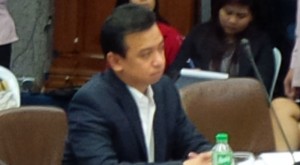Trillanes backs emergency powers for Aquino in dealing with energy crisis
MANILA, Philippines – Senator Antonio Trillanes IV said on Sunday said Energy Secretary Jericho Petilla should urge President Benigno Aquino III to back the measure that would give the chief executive emergency powers to address the looming energy supply crisis and put in place lasting solutions.
Trillanes said he would also try to speak with Aquino to get his support for a bill he filed earlier in 2014 that would allow the President to perform the following functions: enter into negotiated contracts for the repair and maintenance of power plants, projects and facilities; use all funds, including special funds, to finance such projects; and finance subsidy of energy consumption by end users.
“This could be his legacy. The credit would be his, that before his term ended, he was able to do something about the energy crisis,” Trillanes said in a radio interview.
Recently, the Federation of Philippine Industries backed the idea of granting emergency powers to President Aquino, saying electricity expenses have been among the biggest costs of production.
Sen. Sergio Osmeña III, who earlier wanted Secretary Jericho Petilla out of the Department of Energy, said the President should let professionals, instead of local government officials, handle the power supply problem in order to achieve long-term, lasting solutions.
Article continues after this advertisementOsmeña, chair of the Senate energy committee, also said Petilla should act more quickly to address the issues hampering the establishment of more power plants, such as concerns raised by environmentalists and local government units.
Article continues after this advertisementOsmeña said in a radio interview that local government officials were hardly suited for the job of energy secretary, as they were more adept at handling short-term, immediate problems. There is no immediate solution to the energy supply problem, he said.
“That’s why I said appoint people who can hopefully be there for five years so that the streamlining of the energy sector would be handled well,” he said.
“[The President should] professionalize the agencies, bring in long-term thinkers, long-term planners. He could make Petilla an executive secretary. Secretary Petilla has gifts, he’s a very gifted fellow, very bright person,” he said.
But Osmeña criticized two recent appointments: Petilla made to the energy department—one being a protégé from Leyte who has no background on the job and the other being a former Bulacan mayor.
“This is a matter of the blind leading the blind,” he said.
The power supply issue requires long-term planning, especially since building a power plant takes about four years, Osmeña has noted.
But granting emergency powers to President Aquino to address the power crisis is a “dangerous” idea, according to Bayan Muna Rep. Neri Colmenares.
Colmenares thumbed down the suggestion, which was made in response to the widespread energy problem in the country, with Mindanao still experiencing 8- to 12-hour brownouts, and Luzon, 3-hour rotating brownouts.
“It is very dangerous to grant emergency powers to anyone with a dictatorial propensity like President Aquino, as can be seen with his usurpation of Congress’ power and now threatening the Supreme Court when it declared the Disbursement Acceleration Program unconstitutional,” he said.
In a statement, the senior deputy minority leader in the House of Representatives said the country was in a similar situation as in the 1990s, when then President Fidel Ramos was granted emergency powers to address the thinning power reserves.
“But the same [emergency powers] were used instead to allow the entry of favored independent power producers (IPP) to construct power plants within 24 months. Ramos also approved onerous supply contracts that guaranteed the government would buy whatever power the IPPs produced, forcing consumers to pay for electricity they did not even use,” he said.
Colmenares urged the President to support steps to address the power crisis and to have cheaper and affordable electricity.
The congressman said he has proposed a bill which would, among others, prohibit the government from selling what was left of the government’s energy assets, and infuse capital to rehabilitate and increase the capacity of these plants, and order the Department of Energy (DOE) to use the P175 billion Malampaya funds to construct power plants especially those that utilize renewable energy.
The bill also seeks to buy back the power plants sold to the private sector, reform electric cooperatives and institute the policy of regulation of all charges, requiring public notification and hearing before any power rate increase.
RELATED STORY
